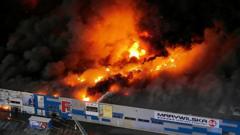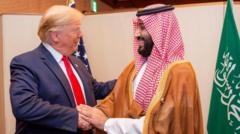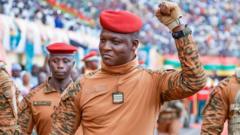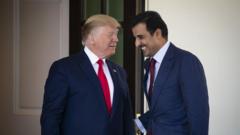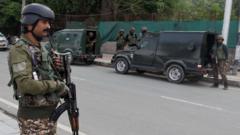As calls intensify for a ceasefire in the Ukraine-Russia conflict, President Zelensky expressed readiness for talks personally with President Putin, aiming to bring an end to the ongoing violence. Trump's recent comments supporting Ukraine's acceptance of a ceasefire offer have added momentum to the dialogue.
Zelensky Invites Putin for Direct Talks Amid Trump’s Call for Ceasefire

Zelensky Invites Putin for Direct Talks Amid Trump’s Call for Ceasefire
Ukrainian President Volodymyr Zelensky proposes face-to-face discussions with Russian President Vladimir Putin in an effort to negotiate peace following Donald Trump’s urge for immediate dialogue.
---
Ukrainian President Volodymyr Zelensky has extended an invitation to Russian President Vladimir Putin for direct negotiations in Istanbul on Thursday, expressing a desire to put an end to hostilities in Ukraine. This announcement came shortly after former U.S. President Donald Trump called for Ukraine to promptly agree to such talks, highlighting the urgency of advancing diplomatic solutions.
On the social media platform X, Zelensky assured his commitment to the meeting, emphasizing a need to halt the bloodshed. He underscored that while Ukraine remains open to discussions, the prerequisite would be a ceasefire, which he hopes Russia will agree to prior to any negotiations. "There is no point in prolonging the killings. I will be waiting for Putin in Türkiye on Thursday. Personally," he stated.
The backdrop to this diplomatic overture includes Western calls for a 30-day ceasefire, initiated after a recent meeting of European leaders in Kyiv. Trump’s reiterated assertion on social media that Ukraine should accept Putin's proposal aligns with efforts from some international actors to seek clarity on the conflict’s landscape. “At least they will be able to determine whether or not a deal is possible,” he remarked.
Putin, during remarks made over the weekend, reiterated his invitation for serious negotiations and mentioned that these talks could potentially lead to a new truce. Notably, he did not address the request for a ceasefire directly, leaving uncertainties about the feasibility of a cessation of hostilities.
There exists a complex dynamic, as Russia has previously stated any ceasefire discussions would be contingent on the West halting its military support for Ukraine. Meanwhile, Ukrainian officials, including Zelensky, continue to stress the necessity of an unconditional ceasefire as the foundation for any diplomatic efforts.
Efforts by Zelensky to facilitate this discourse were highlighted by his meetings with multiple European leaders, who all echoed calls for decisive measures against Russia should negotiations falter. A potential breakthrough in discussions could reshape the political landscape, especially considering the long-standing divergence between the two nations' stances.
Direct negotiations between Ukraine and Russia last took place in March 2022 in Istanbul, when hopes for a timely resolution were dashed by escalating violence. The resumption of talks signifies cautious optimism; however, stark differences remain in each side's strategic demands, revealing the depth of the conflict that encompasses far more than mere political negotiations.
Ukrainian President Volodymyr Zelensky has extended an invitation to Russian President Vladimir Putin for direct negotiations in Istanbul on Thursday, expressing a desire to put an end to hostilities in Ukraine. This announcement came shortly after former U.S. President Donald Trump called for Ukraine to promptly agree to such talks, highlighting the urgency of advancing diplomatic solutions.
On the social media platform X, Zelensky assured his commitment to the meeting, emphasizing a need to halt the bloodshed. He underscored that while Ukraine remains open to discussions, the prerequisite would be a ceasefire, which he hopes Russia will agree to prior to any negotiations. "There is no point in prolonging the killings. I will be waiting for Putin in Türkiye on Thursday. Personally," he stated.
The backdrop to this diplomatic overture includes Western calls for a 30-day ceasefire, initiated after a recent meeting of European leaders in Kyiv. Trump’s reiterated assertion on social media that Ukraine should accept Putin's proposal aligns with efforts from some international actors to seek clarity on the conflict’s landscape. “At least they will be able to determine whether or not a deal is possible,” he remarked.
Putin, during remarks made over the weekend, reiterated his invitation for serious negotiations and mentioned that these talks could potentially lead to a new truce. Notably, he did not address the request for a ceasefire directly, leaving uncertainties about the feasibility of a cessation of hostilities.
There exists a complex dynamic, as Russia has previously stated any ceasefire discussions would be contingent on the West halting its military support for Ukraine. Meanwhile, Ukrainian officials, including Zelensky, continue to stress the necessity of an unconditional ceasefire as the foundation for any diplomatic efforts.
Efforts by Zelensky to facilitate this discourse were highlighted by his meetings with multiple European leaders, who all echoed calls for decisive measures against Russia should negotiations falter. A potential breakthrough in discussions could reshape the political landscape, especially considering the long-standing divergence between the two nations' stances.
Direct negotiations between Ukraine and Russia last took place in March 2022 in Istanbul, when hopes for a timely resolution were dashed by escalating violence. The resumption of talks signifies cautious optimism; however, stark differences remain in each side's strategic demands, revealing the depth of the conflict that encompasses far more than mere political negotiations.



